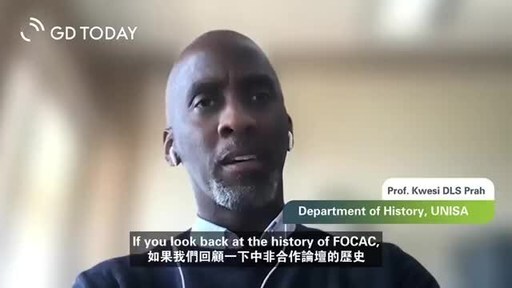Africa falling into Debt Trap because of China, is it true?
GUANGZHOU, China, Sept. 4, 2024 /PRNewswire/ -- News report from GDToday:
The 2024 Summit of the Forum on China-Africa Cooperation (FOCAC) will be held in Beijing from September 4 to 6. Under this particular cooperation framework, China and African countries are expected to deepen exchanges in multiple major areas. In light of this special occasion, GDToday is conducting exclusive interviews with African delegates, shedding light on China-Africa relations, now and in the future.
"FOCAC is a globally relevant platform for all parties involved, as it has been a sustained development of Chinese interaction with African states," said Prof. Kwesi DLS Prah in a recent interview with GDToday, a historian based in the Department of History at the University of South Africa, as the 2024 Summit of the Forum on China-Africa Cooperation (FOCAC) will be held in Beijing from September 4 to 6.
Prof. Kwesi thinks the summit this year would represent another step in the strengthening of Global South cooperation, and particularly between China and different African countries. The summit, under the theme of "Joining Hands to Advance Modernization and Build a High-Level China-Africa Community with a Shared Future," aims to create new avenues for solidarity and cooperation, thereby accelerating the shared development of both sides.
FOCAC 2024 represents another step in Global South Cooperation
Looking back on the two-decade history of the summit, according to Kwesi, one can find out that China signed key action plans of strategic importance to develop the Africa-China partnership in 2006, 2015, and 2021.
China and African countries have developed closer economic and trade ties with an ever-increasing trade volume and diversified commodities and services on both sides.
According to data released by the General Administration of Customs, China has been Africa's largest trading partner for 15 consecutive years since 2009, and trade between China and Africa rose 5.5 percent year on year to about 166.6 billion U.S. dollars between January and July 2024.
"If you're looking at economic development as a key point of focus at FOCAC, then issues like infrastructure, agriculture, and heavy industry are areas in which FOCAC needs to address," said Prof. Kwesi.
For example, in 2023, China's exports of new energy vehicles, lithium batteries, and photovoltaic products to Africa rose by 291 percent, 109 percent, and 57 percent year on year, respectively, as shown by GAC data.
Kwesi observes that what adds to global attention this year is how African governments involve the civil service and general citizenry of their countries in the processes, how China ensures that these agreements are transparent, and how these deals are going to be implemented.
"And generally and most importantly, the transparency of the deals, which is the key to the success of FOCAC," commented Prof. Kwesi.
China's financial support towards Africa is carried out under transparency
In recent weeks, some Western media have claimed that the loans made to Africa by Chinese state-owned enterprises and banks come with incredibly high interest rates and that they are actually private lenders. China is "dragging" African states into a so-called "debt trap."
For Kwesi, there isn't any evidence to support these comments. "You know, it's debatable whether one sees debt as healthy, but it's an aspect of capitalist enterprise that is unavoidable."
He concluded that how debt is used as a tool to manipulate one's interests is not a strange practice. "The key here is how transparent we are about the deals that are made, and whether they are actually developmental in their purpose or purely exploitative," he explained.
He thinks it just comes down to the mutual interests of those engaging in a specific deal or agreement.
"Loans have been taken out over the past two decades through FOCAC agreements and similar China-Africa related agreements, but most of them have served constructive purposes." he detailed, "All the agreements have been put under scrutiny and dealt with by both the Chinese government and the African countries concerned."
Between China and Africa, the large majority of the deals have been beneficial, interest-free, and preferential.
"So, for the most part, the outlook of these agreements and the debt incurred has, on the balance of things, been beneficial for both African countries and China," Kwesi thinks. In comparison to IMF and World Bank agreements, deals made with China have always historically been to the great disadvantage of the Global South.
China-South Africa relations have been mutually beneficial ones
Notably, South Africa was the first African country to join the Belt and Road cooperation and has established a comprehensive strategic partnership with China. Kwesi shared with us the logic behind, or rather, why his home country chose to do so.
"Bilaterally, the relationship between China and South Africa has always been fruitful. It represents one of the largest trading partners for China." Kwesi considers from a bilateral standpoint, it is a strategic move for Africa to do so.
Kwesi thinks political stability is one thing South Africa offers, and economic stability is another. Economically, South Africa is able to branch out into other African countries. "In terms of trade, a lot of agreements have been made over the past 15 years, which have really assisted this African economy." Kwesi mentioned, "not directly through FOCAC, but through other bilateral engagements, and the latest one, which I think has to do with the energy challenges South Africa faces. China has helped a lot."
Moving forward, Kwesi foresees more and more cooperation in the mining and energy sectors, agriculture, as well as social fields, as China and South Africa continue to develop a bilateral relationship.
Kwesi noted that China's economic engagement in Africa comes at the right time. "South Africa faces economic challenges, such as unemployment and infrastructure development, industries that need to be upgraded." Kwesi noted, "So in South Africa and China's sense, the hope is that these strategic visions and plans ensure that the relationship is mutually beneficial," said Kwesi.
Video- https://mma.prnewswire.com/media/2496013/WeChat_20240904100123.mp4






Share this article